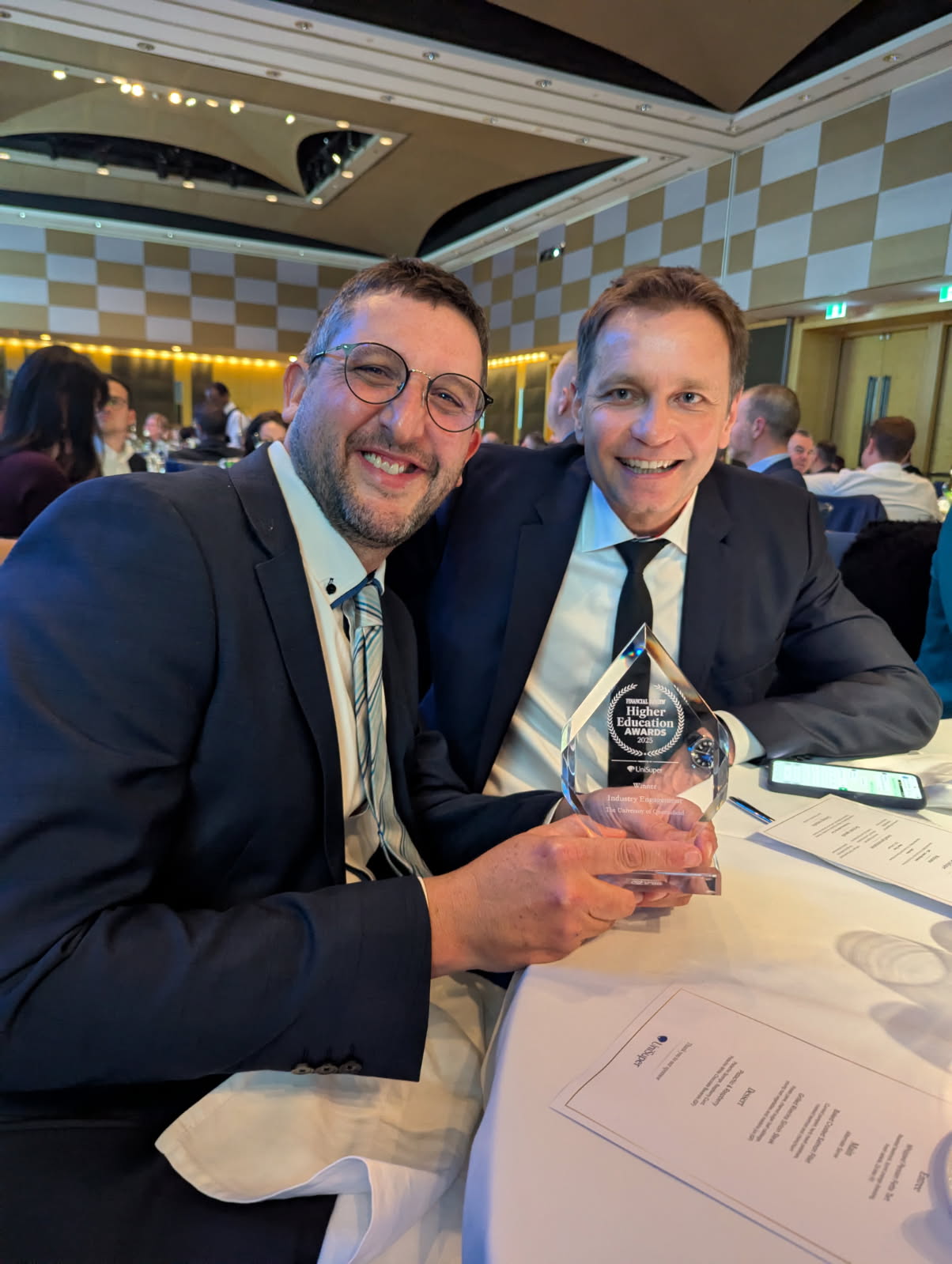UQ’s Biosustainability Hub (the Hub) has won the 2025 AFR Higher Education Award for Industry Engagement, with Hub Director and AIBN Group Leader Professor Esteban Marcellin accepting the honour.

Backed by a A$60 million investment, the Hub is Australia’s first centre designed to help companies shift to lower carbon, sustainable production.
The AFR Higher Education Awards celebrate excellence across the sector, with the Industry Engagement category shining a light on research partnerships delivering real-world impact.
Professor Marcellin said the win reflected the unique partnerships at the heart of the Hub.
“This award is really about the power of collaboration,” he said.
“By working with industry, we can harness biology not just to publish papers, but to potentially transform how we make the things we all rely on like fuels, chemicals, medicines.
“That’s how we could reduce our impact on the planet while building stronger industries for the future.”
That vision is already taking shape, supported by the Queensland Government, UQ, and industry partners including Woodside Energy and many others.
Around 100 researchers are tackling 37 projects already underway, from dairy proteins to sustainable aviation fuel, in collaboration with companies such as All G, MSF Sugar and Fonterra.
Professor Marcellin said the Hub was designed to give industry the scale and ambition needed to make real change.

“It’s about creating a place where companies of all sizes can work side by side with researchers to seek to turn bold ideas into reality,” he said.
“I’m proud that we’re building something here in Queensland that you simply won’t find anywhere else in Australia.”
The initiative builds on more than a decade of world-leading biomanufacturing expertise at UQ’s Australian Institute for Bioengineering and Nanotechnology (AIBN).
“Ten years ago, Professor Lars Nielsen and I were approached at AIBN by LanzaTech to see if we could build a mathematical model to understand microbes that can turn carbon emissions into ethanol,” Professor Marcellin recalled.
“That small idea has grown into a leading biohub driving net-zero innovation.”
Dr Sean Simpson, LanzaTech founder and part of the Hub steering committee, described the initiative as a critical step for the global industry, emphasising its role in bridging research and commercialisation.
“The Hub is a vital platform for connecting academic research with industry-scale innovation,” Dr Simpson said.
“It provides the deep knowledge we need to enable commercialisation and expand the space in which we can convert above-ground carbon resources into sustainable products.”

The award ceremony in Sydney also showcased the Hub’s value for local partners, with Professor Marcellin joined by Jan Pacas, CEO from industry partner All G.
Join The Network
Stay on top of our industry news and developments, events and opportunities, by joining The Network
“Partnering with the Hub gives us access to world-class researchers and facilities,” Mr Pacas said.
“It’s exactly what industry needs and allows companies like All G to scale innovation faster.”
The Hub’s impact reaches from emerging innovators to some of Australia’s largest companies.
“The Biosustainability Hub has the potential to help industry transition to a lower-carbon[1] economy,” said Dr Jitendra Joshi, Head of Carbon to Products at Woodside Energy.
“For Woodside, it’s an opportunity to work alongside UQ researchers on potential solutions that could deliver real impact at global scale.”
Australia currently ranks second to last out of 30 OECD countries on the proportion of businesses collaborating with higher education and public research institutions on innovation, according to OECD data cited by the Department of Education.
AIBN Director Professor Alan Rowan said the award underscored the Hub’s pivotal role in closing that gap and shaping Australia’s bioeconomy.
“This shows just how urgent it is to bridge the gap between research and industry,” Professor Rowan said.

“The Biosustainability Hub is exactly that bridge - a place where companies can cost-effectively tap into R&D and seek to build innovations that deliver both economic and environmental impact.
“It’s fantastic to see AFR recognise the Hub’s role as a national model for university-industry collaboration.
“The Hub is driving Australia’s bioeconomy by creating jobs, building industries, and tackling global challenges all at once.”
The Hub now has eleven research leaders spanning Queensland Alliance for Agriculture and Food Innovation (QAAFI), School of Chemistry and Molecular Biology (SCMB), School of Chemical Engineering, School of Civil Engineering, Australian Institute for Bioengineering and Nanotechnology (AIBN), and School of Agriculture and Food Sustainability (SAFS), providing expertise in gas fermentation, precision fermentation, bioengineering, and bioprocess optimization.
The hub will be co-located at UQ’s Andrew N. Liveris Building and AIBN and is open to industry, researchers and governments from Australia and overseas.
The AIBN project is progressing in close collaboration with UQ Properties and Facilities Division, Wilson Architects, ADP Consulting, Wood Consulting, FARA Construction, and the Liveris Infrastructure team to ensure its timely completion by the end of 2025.
Want to learn more about this story or how you can partner with AIBN on ground-breaking research?
Contact us via email: communications@aibn.uq.edu.au
or phone: +61 414 984 324
[1] This term is used to describe the characteristic of having lower levels of associated potential GHG emissions when compared to historical and/or current conventions or analogues, for example relating to an otherwise similar resource, process, production facility, product or service, or activity. When applied to Woodside's strategy, please see the definition of lower-carbon portfolio.


